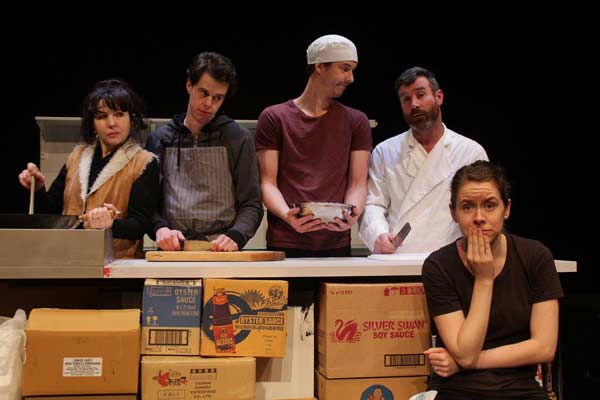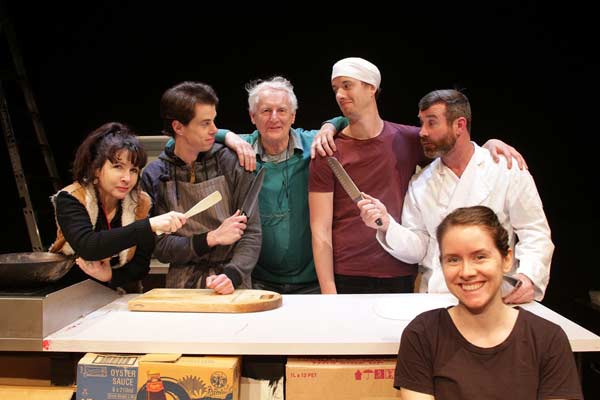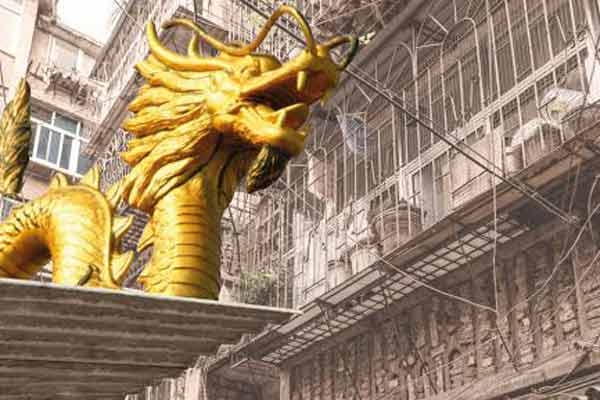In The Bakehouse Theatre Company’s 'The Golden Dragon', sub-plots and allegory interweave like an Oriental rug in Roland Schimmelpfennig’s chaotic three cuisine Asian restaurant.
For Director Joh Hartog, this is his second occasion steering a play by the German playwright; we ask what he wants audiences to take away from this Asian restaurant.
'The Golden Dragon' is a comedic German play; what do you think are the peculiarities of German humour and how readily do they translate to Australian audiences?
'The Golden Dragon' has comedic elements but is not essentially a comedy. Its humour relates primarily to what you might term: the absurdity or peculiarity of human life. It shows this but does not comment on it. Also, I think it is a bit of a myth that different countries have vastly different senses of humour, which are unreadable to a lesser or greater extent by other nationalities.
No doubt there are some differences, but on the whole I think people the world over can see the funny side of anything, be it slapstick, word games, double entendre or any other variant. The difference between individuals is usually much greater than between nationalities or ethnicities, at least in my experience, having travelled to many different places. I think that on the whole it is due to a lack of familiarity when one group of people finds something humorous which another group does not. As an Australian of Dutch descent I can assure you that my ‘reading’ of Australian humour took a while to appreciate, but that had less to do with what was ‘funny’ and more with not being able to quite read Australian inflection and presentation.
When, as a director, you are dealing with a ‘foreign’ play, you tend to domesticate to a degree what is foreign about it, to automatically adjust it to your own understanding of the world. The actors are Australian, hence their understandings and inflections will be Australian and that solves what otherwise might be lost in translation. This is not to say there are no differences, but merely that those differences are much smaller than we tend to believe. Rather than German or any other senses of humour, it is much more difficult to deal with differences in language – dialect, regional tone, social class, vernacular – because these are often truly related to a specific nationality or locality. It would be hard to truly reflect in Australia a play that’s situated in the backblocks of some Hungarian or Chinese town, written in its own dialect.
However, 'The Golden Dragon' is a product of the – largely Western oriented – Global Village. The language and the humour is readily understandable in Australia, mainly because this play could just as easily take place in Australia. References to illegal immigrants, broken marriages, domestic abuse and the ever present Chinese/Thai/Vietnamese restaurant in every suburb apply as much to Australia as any other country in Europe or elsewhere.

While it is complex work containing many sub-plots, what are the major themes that you have identified?
In my opinion the main theme is displacement. The centre of the play is the kitchen in 'The Golden Dragon', the ubiquitous Chinese/Vietnamese/Thai restaurant. This already crosses national and language boundaries, as China, Vietnam and Thailand are very different countries with very different tastes, but which we in the West collapse into ‘Asian’ or ‘Oriental’.
On the other hand, we do make a difference between a French, German or an Italian restaurant. In this play, while the five ‘Asian’ cooks in the kitchen are displaced from East to West, the actors playing the Asian cooks are themselves white, a further displacement. Other characters are also displaced, or find themselves in a situation they would rather not be in. An old man would like to be young, one couple finds their future skewed by an unanticipated pregnancy and yet another couple is going through a breakup.
As a consequence of this theme there exists a deep lack of compassion and empathy for others; everyone is focused on their own survival, whether it is a rotten tooth, a never ending string of orders, or an unsatisfactory relationship. Everyone survives from day to day. And yet, because what the audience is presented with is not real life, but a theatrical production, and that allows for magic: the magic of the imagination; whether it is dreaming of the coast of Vietnam or an imaginary story of floating under the ice. I strongly feel that this magic suffuses this play, not just in content but in structure, not dissimilar to the way an audience can come out of an opera performance uplifted and refreshed in spite of a tragic story, because it is the music and singing that transported them to another level.
The brilliant construction of 'The Golden Dragon' aims to do the same: presenting you with an artistic and beautifully executed image of life not dissimilar to an Impressionist painting which itself does not necessarily represent beauty.
The play is logistically complicated, with five actors playing a dozen roles and an allegorical interlude. What challenges has this presented?
This is an extremely challenging play to stage. The rapid changes for each actor between often highly dynamic scenes is difficult, both craft-wise and from an acting perspective as there are vast differences between each character they play. Schimmelpfennig plays with age and gender as if there’s no tomorrow. Also not everything takes place in the same time frame. Some of the individual narratives (which all intersect at some point) appear to be a single day/evening, others appear to span a few weeks. Some scenes are fully realised while others are paired back to the barest minimum. Some of it is basic naturalism, some are flights of fancy. And yet Schimmelpfennig knits all this together in a breathtaking fashion to arrive at a single, multi-facetted impression.

Characters break the fourth wall by speaking stage directions. What purpose do you think this serves?
Breaking the fourth wall was nothing special until the invention of Realism on stage. Before this, actors often addressed the audience directly. The project of Realism is to transport the audience to the world of the play as if they are directly there. In my opinion film and television does that much better nowadays, and this leaves the theatre free to present overtly theatrical productions. The greatest benefit of a live production, as distinct from any other kind, is that the actors and the audience are in the same space and can communicate. In plays like this we do not pretend that what happens is anything other than a theatrical production; perhaps it reflects real life but it does not pretend it is.
To underscore this the actors can talk directly to the audience, either as the character or as the actor playing the character. In this case they even speak at times stage directions, such as ‘pause’ or ‘short pause’. The consequence of this – and possibly its purpose – is that the audience is forced to use their intelligence and their imagination to translate what they see into an understanding of ‘real’ life or at least what is real to them. In this way the artifice creates a better understanding of what that artifice is referring to.
What unique perspectives and influences have you brought to your production?
My approach to any play is first and foremost related to what the play demands. So I try to identify what is unique in the play. Having previously directed 'Arabian Night', also by Schimmelpfennig, I was therefore aware of the demands he often makes of theatre makers.
I am fond of plays that push the boundaries between stage and real life in unexpected and surprising ways, because it is this that can often break through to the audience and make an impact. Several of highly regarded German playwrights play a lot with these concepts and hence I am quite drawn to them. Theoretically this has a lot to do with Postmodernism, but to give it a label is probably more of a hindrance than a help. I believe that the theatre is first and foremost a space in which not only to present a play but also a space in which to actually play in the widest sense of the word. And that can mean letting your imagination run riot.






